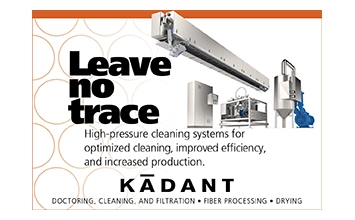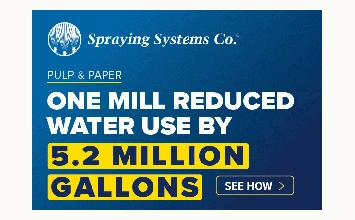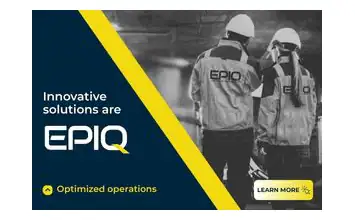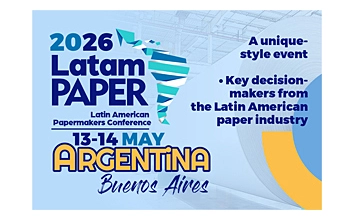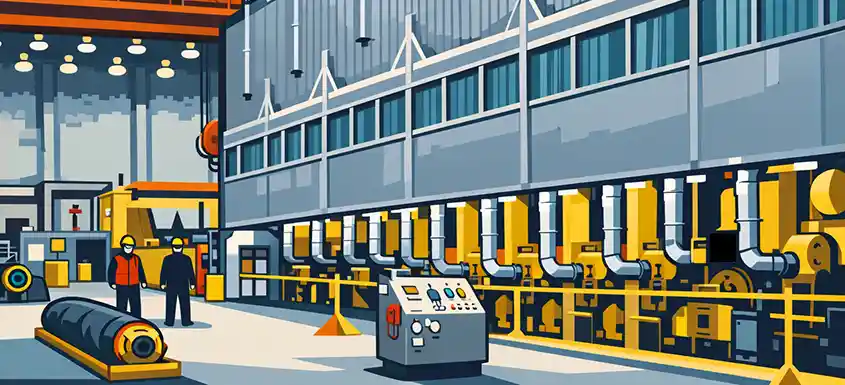As TAPPI CEO Larry N. Montague prepares to retire, he reflects on the evolution of the association and his role in it.
As Larry Montague prepares to retire from his role as President and CEO of TAPPI, he leaves behind a remarkable legacy at the helm of one of the pulp, paper and packaging industry’s most respected technical associations. Over the course of his tenure, Montague has guided TAPPI through a period of profound change in both the industry and the broader professional landscape, ensuring the organization not only remained relevant but continued to thrive. In this conversation, he reflects on his journey, the challenges and opportunities that shaped his leadership, and his vision for the future of TAPPI and the industry it serves.
Founded in 1915, TAPPI now boasts 6,000 members across 60+ countries. What was TAPPI’s raison d’etre? As the industry began to grow and become more global in the early 20th century, it soon became evident that industry standardization would be a must if trade was to increase.
Prior to that, the industry was centered in the northeast U.S., but papermakers wanted to boost their business. As it started to ship to regions further away, it was soon evident that oftentimes, what the producer sent and what the customer expected were not the same thing.
“That’s what really got TAPPI going,” says Montague. Now, universal standards exist for pulp, paper and packaging.
Overall, the association enjoyed great success through the years. But as times changed heading into the late 1990s, TAPPI was slow to change with them. Various financial crises, M&As, company downsizing (not great for an association dependent on membership), the increasing ease to communicate with others via the Web, led some to question the value of the association.
When Montague was hired to lead TAPPI in 2006, he notes that the association had lost $24 million over the past 11 years adding that the organization’s situation at the time was “very scary. I didn’t realize it was that bad.”
Tough decisions had to be made; at one point the idea of giving TAPPI’s equity to the various U.S. universities with pulp and paper schools was discussed, effectively dissolving a respected global institution.
Instead, it was decided to try to turn things around. Enter Larry. He has started in sales with Boise Cascade in 1980 and was working with the Newark Group when he joined TAPPI.
Montague recalls that members had felt that TAPPI had lost its way, that it was staff- not member-driven. Membership numbers was suffering and participation In TAPPI events was dropping.
The first thing he did was ask staff what was the one thing they would do if they were king or queen for a day: what would they start doing, stop doing. Where was TAPPI messing up? “I received a lot of good ideas, some that weren’t so good.”
Then, he asked the same of TAPPI’s members (including the student chapters), paying close attention to the leading naysayers. “Bottom line: I needed to get in front of the people. We asked a lot of questions and realized we were missing the boat.”
MEMBERS COME FIRST
Internally, Montague found that too many “silos” between the departments -- e.g., events, marketing, training, standards -- had been built and he had to foster a culture that would tear them down and ensure everyone worked toward a common goal.
Cutting waste and duplication of effort was the key as well as orienting efforts towards what the members wanted/needed. In Montague’s first full fiscal year as president, TAPPI cut its loss by more than 67%, from $3.4 million to just over $1 million. Since, TAPPI has enjoyed 18 straight years in the black.
Putting the member back at the top of the organization chart was the foundation of TAPPI’s turnaround. And, Montague says a lot of the success has to do with listening to what the members had to say.
However, financial stability didn’t mean an end to turbulent times. Shifting markets, more M&A activity, the great financial crisis of 2008 all had an effect, But, ask Montague the one event that most affected him during his time with TAPPI and he answers without hesitation: “COVID.”
As he explains, “Anything that thrives on face-to-face all came to a screeching halt. For TAPPI, that meant no conferences or trainingcourses, both major sources of revenue for the association.
As well, a lot of money had already been spent on deposits as major events need to be planned years in advance (up to 2032). TAPPI was able to talk with itsevent vendors, assuring them that once the crisis was over, it would be back. Asa result, these deposits were not lost.
Through Zoom calls and other measures such as online training, the staff kept TAPPI’s activities going. Despite the loss of revenue. TAPPI still managed to turn a $6,000 profit in 2020. Montague gives full credit for this to TAPPI’s employees.
STAYING RELEVANT
Keeping TAPPI relevant in a changing industry when other associations have faltered is an ongoing task. Montague says it is still important to keep asking questions. And, then listening to the answers.
Going back to the beginning of this process, Montague say, “They got on the bandwagon with us and supported even more. They felt appreciated and proud that we would ask for their input and then implement it. That was a home run.”
Montague cites TAPPI Journal as another example of evolution within the association. Previously, articles had to come from members. Now, the principle of open access applies.” It’s made the Journal better and led to even more people joining TAPPI.”
Other industry-related associations were finding themselves falling on hard times and turned to TAPPI for help, for example, PIMA (Paper Industry Management Association). “This was one of the greatest things that ever happened,” says Montague. At one time, under TAPPI’s association management services (AMS) group, six or seven smaller, industry associations were being managed by TAPPI.
Another example is ASPI (Association of Suppliers to the Paper Industry). When TAPPI took over ASPI’s management, Montague says, “We asked them the one thing we could do that would be a home run for them.”
ASPI asked for a standard orientation program for unescorted visitors. “That wouldn’t only be a homerun, but a grand slam.” (Anyone familiar with Montague knows he is a huge baseball fan.)
With supplier representatives visiting mills constantly, a standard authorization program for visitors would be of great benefit. Out of this request came one of TAPPI’s most successful and still growing programs: TAPPISAFE. It is the first industry-recognized safety orientation and verification program.
Now, after taking the program, a visitor does not need to redo the safety authorization procedure each time he/she visits a mill. By the numbers, it has helped more than one million people (15,000+ contractors/suppliers). More than 120 facilities are part of the TAPPISAFE program and there are more than 200 courses available for safety orientation and training.
But the main benefit according to Montague: “Everyone gets to go home safe and sound.”
Within TAPPI, Montague can say the “silos” have come down. The senior strategy team (SST) meets weekly and, Montague recalls, each division would do its own thing. Now, the various representatives realize that they all have a part to play in maintaining the association’s success and work together. “That’s something I am really proud of with our team. We used the segregate the divisions and that’s what they became: divisions,” Montague adds.
 Tappi Headquarters Peachtree Corners, Georgia, USA
Tappi Headquarters Peachtree Corners, Georgia, USA
LOOKING AHEAD
TAPPI is well known for its technical expertise and networking opportunities. How has Montague seen the role of a professional association evolve in today’s digital and globalized environment? “I’ve been on more international Zoom calls than ever in the last two years.
“Nothing replaces face-to-face and nothing ever will, but do the economics. Besides saving time and money, it sure gets the job done. We’re using AI to record things. We are reaching a bigger audience, which is very much needed.”
As producers concentrate more and more on their core business – making and selling product – complementary tasks such as training are often outsourced. For example, training people for roles where they don’t need to be a chemical engineer. This means working even more with theuniversities and colleges, even down to the high school level where students are introduced to the industry and see that a career with a well-paying job using modern technology is possible.
TAPPI has good relations with the large producers and as relative newcomers to America such as Smurfit and Sofidel make their mark, TAPPI has worked to include them in the TAPPI family. “We ask them to speak at our events,” says Montague. And training is often as issue with them especially if they are not familiar with American workers. “They ask us for a lot of training and if we don’t have it, we figure out a way to get it.”
Where does the next generation of leaders come from? The producers and suppliers are in a tough competition for skilled workers. Montague again cites TAPPI’s student chapters. As the industry ages – The Silver Tsunami has been an issue for years – these students are a valuable resource for producers and suppliers alike.
The TAPPI-PIMA Student Summit is held annually over MLK weekend, and Montague explains how the industry’s players (producers and suppliers) are there, interviewing students. “They urgently needskilled workers and TAPPI is helping to fill that talent pipeline by connecting these brilliant students with companies in our industry.” Montague says.
Remote work, robotics and drones are some of the new tools mills are employing. Montague says that technology is still growing and evolving every day and adds that he thinks it’s “getting better”. Modern equipment is safer to operate and helps improve productivity. “It helps the morale of employees if they think their needs are being taken care of.”
With the new technology, what the next generation mill looks like is still an open question. And, what skills will the employees need? TAPPI is continually being asked about training. “TAPPI has to be flexible. The more knowledge we have, the better we are.” Montague explains that the training courses offered can be held at the customer’s choice of site, including a training facility at TAPPI’s headquarters.
Another example of TAPPI’s evolution is its growth in the corrugated packaging sector. The association hosts corrugated events as such as CorrExpo, Corrugated Week and once every four year mega event--SuperCorrExpo®, which TAPPI co-hosts with the AICC. He notes that corrugated is one of TAPPI’s fastest growing divisions. He adds that he is seeing more and more paper industry people showing up at the corrugated events. This is no surprise considering the number of graphic paper machines that have been converted to produce packaging grades in recent years.
The challenges that Montague faced when he joined TAPPI still exist and you can add increased geopolitical tension that affects international trade to the list. M&A activity will continue and the industry will see bigger companies that will inevitably result in fewer employees, a fact that makes him nervous. But he knows it can’t be stopped.
But he is optimistic. “It is a great industry and if you are in it, appreciate it.” He likens it to a big fraternity where friendships for life are made.
What has Montague learned from his time at TAPPI and what would he would like to pass on to his successor (yet to be named). He goes back to what he thinks led to TAPPI’s renewal: Put the members first. “Meet them. Keep them active. Treat them like they should be treated, but more so how they want to be treated. Ask them what they want. Listen to them. Do the best job you can and help others.” He shared his mantra that he’s been sharing with the industry since he joined TAPPI 19 years ago. There are two types of people in this industry; TAPPI members, and those who should be.
About TAPPI
TAPPI is the leading association for the worldwide pulp, paper, tissue, packaging and converting industries, and publisher of Paper360° Magazine, Tissue360° Magazine and TAPPI Journal. Through information exchange, events, trusted content and networking opportunities, TAPPI helps members elevate their performance by providing solutions that lead to better, faster and more cost-effective ways of doing business. TAPPI celebrates 110 years of service this year for the forest products industry. For more information, visit tappi.org.

Graeme Rodden has covered the pulp and paper industry for more than 40 years, including serving as editor of several well-known paper industry magazines.












